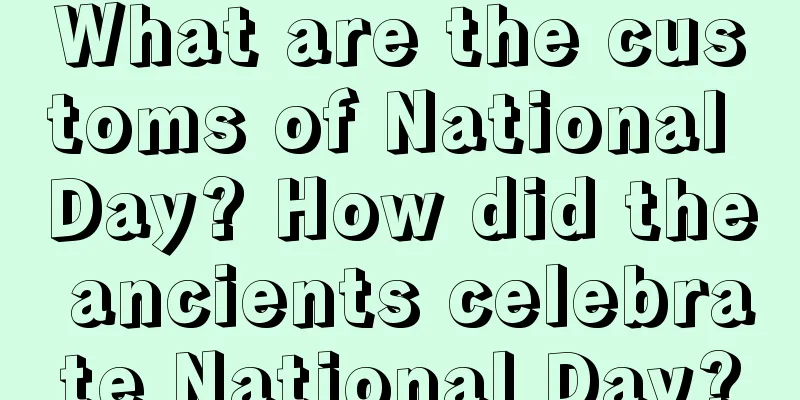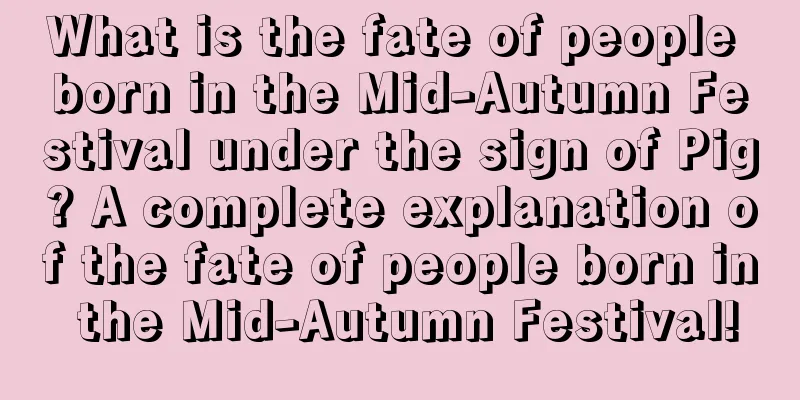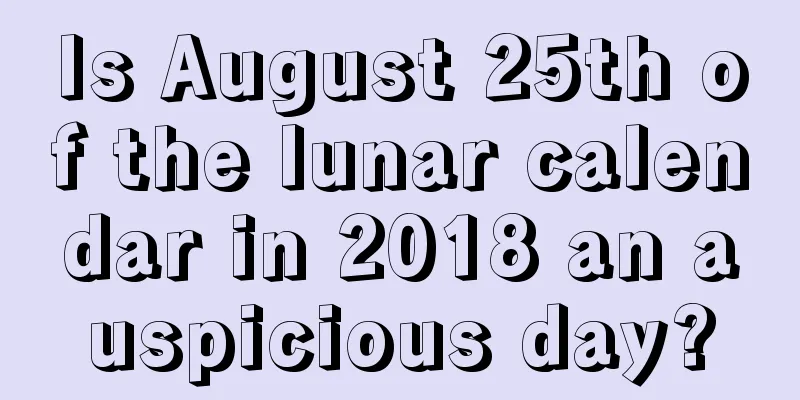What are the customs of National Day? How did the ancients celebrate National Day?

Different festivals have different ways of celebration. As a festival celebrated by the whole country, what kind of customs does National Day have? Today I will reveal to you how the ancients celebrated National Day! The eighth month of the lunar calendar is also called "Mid-Autumn", and every autumn rain brings a chill. Shuimoxiansheng.com will accompany you through every day of the eighth lunar month of 2020.What are the customs of National Day?1. Raising the national flag and singing the national anthem Every National Day, a grand flag-raising ceremony is held in Tiananmen Square in the capital, and the central government also delivers a message. 2. National Day Military Parade The National Day Military Parade is the largest and most grand custom of China's National Day, which is usually held once every ten years. In history, the six major military parades that had the greatest influence and were the most representative were the founding ceremony, the 5th, 10th, 35th, 50th and 60th anniversaries of the founding of the People's Republic of China. Today is the 65th anniversary and we are looking forward to it... Tips: In September 1960, the CPC Central Committee and the State Council implemented the policy of "practicing strict economy and building the country through diligence and thrift", reformed the National Day ceremony system, and implemented "a small celebration every five years, a big celebration every ten years, and a military parade on every big celebration." 3. Holidays Since 1999, the National Day has become the "Golden Week" holiday for the Chinese. In addition to the statutory three-day holiday, the two weekends before and after will be combined to make a total of 7 days off.What should we eat on National Day?National Day is a day that deserves great celebration, so naturally everyone will eat more heartily. Generally speaking, chicken, duck, fish and meat are indispensable on the table. In some places, dumplings are also eaten because they are very important in Chinese festivals.How did the ancients celebrate National Day?Han Dynasty - Five Days of Drinking <br /> During the Han Dynasty, Emperor Wen of Han issued an edict on the night of his accession to the throne: "When I first ascended the throne, I will pardon the whole country, grant the people one level of nobility, and give the women a hundred households of cattle and wine, and feast for five days." Not only did he pardon the whole country, he also gave the people wine and food, and they could also drink for five days. It was really a national celebration! This was probably the first National Day.Early Tang Dynasty - Gift Giving <br /> As an agricultural nation, Chinese people's traditional festivals are often related to solar terms. For a long time, people didn't care much about birthdays. As Buddhism gradually became popular, people began to pay attention to birthdays under the influence of Buddha's Birthday. By the Tang Dynasty, the emperor's birthday celebrations had developed into a very grand event. On this day, the emperor would hold a banquet to entertain all the civil and military officials in the court, and the ministers would also "legitimately" give gifts to the emperor to curry his favor. The Great Tang Dynasty - Universal Celebration <br /> Although the emperors of the early Tang Dynasty had their own great achievements, no one was narcissistic enough to make his birthday a national holiday. But there are always "greenhorns", such as Emperor Xuanzong of Tang, Li Longji. In the fourth year of the Fengshan ceremony at Mount Tai, officials could hardly find anyone to flatter who they had not flattered before. So they decided to start with National Day. So, the officials jointly submitted a memorial, the general idea of which was that such a wonderful moment as Your Majesty's birthday should be designated as a fixed holiday every year so that people all over the world can celebrate the prosperity of the world! Therefore, Emperor Xuanzong of Tang, who was delighted, formally established the Qianqiu Festival and wrote the National Day process into the famous "Kaiyuan Ceremony of the Tang Dynasty". In this way, the first National Day written into law in Chinese history was born. In addition to hosting a banquet to entertain his ministers, Emperor Xuanzong of Tang ordered musicians to compose music such as "Qianqiu Music" and "Qingbei Music" for the festival. He also launched a large-scale art performance in the square in front of Hua'e Tower in Xingqing Palace, which also included a series of acrobatic activities such as wrestling, sword throwing and catching, pole climbing, ball kicking, rope stepping, and stilt walking. Ming and Qing Dynasties - Gorgeous Clothes <br /> By the Ming and Qing Dynasties, the Qianqiu Festival was obviously no longer enough to satisfy the narcissistic emperors' praise for their own great achievements, so the emperors started to celebrate the Wanshou Festival. At that time, this festival was given extra attention and its status rose to an extremely high position, and it was called one of the three major festivals together with New Year's Day and Winter Solstice. On the day of the Wanshou Festival, the capital was filled with joy and peace, and the main streets were all decorated colorfully by the government. Private individuals are prohibited from slaughtering animals or wearing plain clothes. They can celebrate the day as they please. Officially, the death penalty will not be carried out on this day, and even criminal cases will not be handled. In order to show the "imperial grace", the court will also introduce specific universal measures, such as tax reduction and exemption. Of course, the "National Day" of the ancients was nothing more than a celebration of the emperor's birthday. National Day in the modern sense was born during the Republic of China period. In September 1912, the government of the Republic of China designated October 10 as the National Day of the Republic of China. But what is regrettable is that the National Day at that time was just a "self-entertainment" for a few intellectuals, and the Nationalist government did not truly liberate the vast majority of working people. |
>>: What does the Mid-July Festival mean? Why do we burn paper during the Ghost Festival every year?
Recommend
Why do we set off firecrackers on the fifth day of the Lunar New Year? What are the traditional customs on the fifth day of the first lunar month?
It is quite common to set off firecrackers during ...
What is the direction of the God of Wealth on October 14, 2021 in the lunar calendar?
The tenth month of the lunar calendar is the golde...
Is Dragon Boat Festival suitable for housewarming celebrations? Any comment?
Because the Dragon Boat Festival is around the sum...
Is the fifth day of the fourth lunar month in 2021 an auspicious day? What is an auspicious day?
The pros and cons of different days are different,...
Can we start work on the 20th day of the seventh lunar month in 2022? What preparations should be made?
The seventh month of the lunar calendar is the ear...
Can we install the door on December 14th, 2021? What kind of Feng Shui can a front door bring in wealth?
The twelfth month of the lunar calendar is the end...
Can I move house during the Lantern Festival? Can I move after the Lantern Festival in 2021?
Speaking of moving, I believe everyone is familiar...
2019 Lunar New Year 30th Lunar Month Auspicious Hours and Inauspicious Hours
The arrival of the first month of the lunar calen...
Is it a good day to get married on the seventh day of October 2020, the day before Xiaoxue? Lunar October wedding auspicious day 2020
Introduction: Marriage is one of the important mat...
Where is the direction of the God of Happiness on August 16, 2018?
Want to know more about the dates in the eighth m...
Is June 1, 2019, Children’s Day, a suitable date for opening a new store?
Introduction: According to the traditional customs...
Is it good to be born on the Spring Equinox? Analysis of the fate of those born on the Spring Equinox
Everyone's destiny is different from others, a...
Where is the God of Wealth on the ninth day of the eleventh lunar month in 2021, and what is the direction of the God of Wealth?
The eleventh month of the lunar calendar has arriv...
Can’t have sex on Double Ninth Festival? Can’t go out? Can’t I go back to my parents’ home?
As a traditional Chinese festival, the Double Nint...
Can I celebrate my birthday on the Ghost Festival in 2019? Is it unlucky to celebrate my birthday on Ghost Festival?
Introduction: The Zhongyuan Festival is also known...









